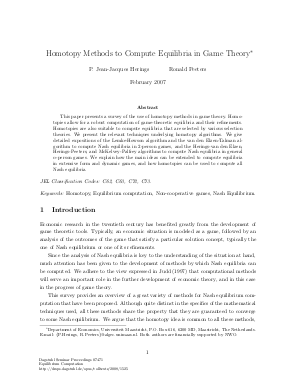Homotopy Methods to Compute Equilibria in Game Theory
Authors P. Jean-Jacques Herings, Ronald Peeters
-
Part of:
Volume:
Dagstuhl Seminar Proceedings, Volume 7471
Part of: Series: Dagstuhl Seminar Proceedings (DagSemProc) - License:
 Creative Commons Attribution 4.0 International license
Creative Commons Attribution 4.0 International license
- Publication Date: 2008-06-04
File

PDF
DagSemProc.07471.3.pdf
- Filesize: 414 kB
- 40 pages
Document Identifiers
Subject Classification
Keywords
- Homotopy
- Equilibrium computation
- Non-cooperative games
- Nash Equilibrium
Metrics
- Access Statistics
-
Total Accesses (updated on a weekly basis)
0Document
0Metadata
Abstract
This paper presents a survey of the use of homotopy methods in game theory. Homotopies allow for a robust computation of game-theoretic equilibria and their refinements. Homotopies are also suitable to compute equilibria that are selected by various selection theories. We present the relevant techniques underlying homotopy algorithms. We give detailed expositions of the Lemke-Howson algorithm and the van den Elzen-Talman algorithm to compute Nash equilibria in 2-person games, and the Herings-van den Elzen, Herings-Peeters, and McKelvey-Palfrey algorithms to compute Nash equilibria in general $n$-person games. We explain how the main ideas can be extended to compute equilibria in extensive form and dynamic games, and how homotopies can be used to compute all Nash equilibria.
Cite As Get BibTex
P. Jean-Jacques Herings and Ronald Peeters. Homotopy Methods to Compute Equilibria in Game Theory. In Equilibrium Computation. Dagstuhl Seminar Proceedings, Volume 7471, pp. 1-40, Schloss Dagstuhl – Leibniz-Zentrum für Informatik (2008)
https://doi.org/10.4230/DagSemProc.07471.3
BibTex
@InProceedings{herings_et_al:DagSemProc.07471.3,
author = {Herings, P. Jean-Jacques and Peeters, Ronald},
title = {{Homotopy Methods to Compute Equilibria in Game Theory}},
booktitle = {Equilibrium Computation},
pages = {1--40},
series = {Dagstuhl Seminar Proceedings (DagSemProc)},
ISSN = {1862-4405},
year = {2008},
volume = {7471},
editor = {P. Jean-Jacques Herings and Marcin Jurdzinski and Peter Bro Miltersen and Eva Tardos and Bernhard von Stengel},
publisher = {Schloss Dagstuhl -- Leibniz-Zentrum f{\"u}r Informatik},
address = {Dagstuhl, Germany},
URL = {https://drops.dagstuhl.de/entities/document/10.4230/DagSemProc.07471.3},
URN = {urn:nbn:de:0030-drops-15257},
doi = {10.4230/DagSemProc.07471.3},
annote = {Keywords: Homotopy, Equilibrium computation, Non-cooperative games, Nash Equilibrium}
}
